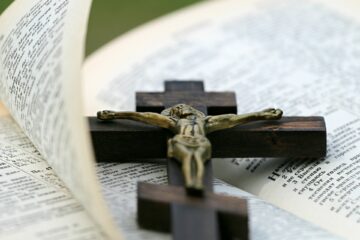Introduction
Reported cases of sexual abuse by Catholic priests or other Catholic Church representatives have been coming into light in the past few years and months. This is a deep and saddening wound for the Catholic Church, and for the rest of the Catholics, both clerics and lay persons. I have seen several comments on the social media, most of which are angry comments, and rightly so. However, I could not help but notice that there seems to be lack of knowledge about the Church’s procedures on such matters. I personally think that I ought to address and discuss two of these aspects in this blog post.
First Aspect: The Church vis-à-vis the State and their Jurisdiction
Both the Church and the State have their own laws and jurisdiction. There might be cases where members of the Church break laws made by the Church herself but which might be irrelevant for the State, for example a cleric who attempts marriage (c. 1394 §1). In such circumstances the Church has jurisdiction to sanction her members, depending on each situation. There might be other cases where a Catholic person breaks a law according to the State for which the Church has no jurisdiction on, for example, robbing a bank. This is very crucial: although robbing in general goes against the 8th commandment, it is not governed by Canon Law (i.e., the law of the Church) that is, unless the robbery is committed within an Ecclesiastical environment by a Catholic and unless scandal needs to be repaired or prevented (c. 1399). In case the robbery occurred within the environment of the Church, the State ought to investigate to convict, while the Church ought to investigate to sanction (i.e. give a penalty to her member committing the action).
The Church cannot send anyone to jail but she is to comply with the State (i.e. unless we are speaking about Vatican City which we will not delve into today). In such cases where members of the Church commit actions that go against the laws of the Church as well as that of the State, both institutions collaborate for the sake of truth and justice. This is what happens in sexual abuse cases committed by Church representatives: both the State and the Church investigate an allegation and its truthfulness, but their ‘punishments’ are different. The State has the power to send a Catholic person to prison while the Church does not have that power. The Church can however, give a penalty to a Catholic priest like for example the removal from clerical state (i.e. defrocking). The fulcrum here is the collaboration between the Church and the State.
Second Aspect: Presumption of Innocence
One must note that truth and justice are sought not only for the victim but also for the accused person. We have the tendency to ‘convict’ an implicated person (especially on social media) before the civil courts have decided in favour of it or otherwise. No matter how ugly the situation is, we must keep in mind that a person enjoys the presumption of innocence until that person is proven to be guilty. One might assume that an allegation is automatically true, but unfortunately this is not always the case. This is why both institutions are there, to get to the truth as much as possible. This is very much in line with the article 6 of the European Convention of Human Rights which protects the right to a fair trial.
Furthermore, one might note that during an investigation, the Church might suspend the implicated cleric from his duties. One should not assume that such a person is guilty at this stage nor should one think that this is a penalty imposed by the Church. What the Church authorities are doing here, are taking precautionary measures (Vademecum, 61), both for the alleged victim as well as for the alleged abuser. Canon Law does not allow the imposition of perpetual penalties without a trial (c. 1342) as without a trial the right of defense is not guaranteed and in this regard the Church practice is in line with the norms of due process which prevail in the secular world.
The Church has recently been working on the penal process and it is fair to say that in this day and age Church officials are now mandated to report to state authorities as soon as a report is made known (VELM, Art. 1 §1). Additionally, bishops are personally accountable for failing to properly address such reports (VELM, Art. 12 §4). Guidelines have been clearly published and they are also subject to revision. This shows the proactivity of the Church towards her aim, that is, to always protect all individuals especially minors and the vulnerable.
Conclusion
As already mentioned Pope Francis is continuously working on updating the Church’s procedures in order to facilitate the way for such truths to be revealed. It is to no surprise that many allegations are being in fact uncovered now. When such reports come to light, indeed they shock the world. One immediately becomes angry at the Church because after all, she was entrusted by Christ to protect every human being, especially the vulnerable and the young ones. When it is proven that such allegations are true, there might be no way of restoring justice compared to the damage inflicted. However, we must also remember that there are very dedicated priests out there as well; we must remember that the Church continues to flourish because besides of ordained men, it also consists of lay men and women, and families, whom the Church needs in order to continue fulfilling her mission of saving souls (c. 1752).
One tends to go against God and the Church in such circumstances. Yet they are not to blame. God loves each and every one of us, every one of us is his unique project after all (i.e., this also includes both victims and abusers). Whoever loves, lets his loved ones free. This is why we are all free. When a person hurts the other, it does not mean that God is bad or wrong for allowing it. Indeed when a person hurts the other, the person’s abuse of God’s freedom is what we need to be upset with. This is one of the reasons why the Church created her own legal system, that is, Canon Law, so that she can sanction through fraternal correction and/or penalties depending on the circumstances of each and every situation.
Very Important: What We Need to Remember
- The Catholic Church’s Canon Law binds only Catholics hence why my emphasis on ‘Catholic person’ and ‘Catholic priest’ in my examples above.
- The Church cannot be blamed for not convicting a person, because that is the role of the civil courts and not of the Church.
- The Church can however give penalties, depending on the outcome of the investigation(s).
- An allegation is not a proof.
- A person should not be presumed guilty but on the contrary, a person must be presumed innocent until proven otherwise.
- Before commenting on social media, remember that both the alleged victim and the alleged abuser have families and friends online that may suffer seeing those very comments. Let’s think before we type behind our screens.



0 Comments